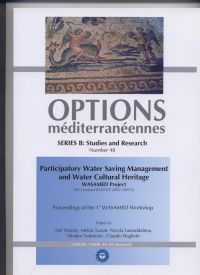| Article précédent | p. 185-198 | Article suivant |
Participatory water saving management and water cultural heritage: Lebanon country report
The Lebanese experience in participatory water management is recent and undeveloped. The small size irrigation schemes and the weakness of water management services have left a gap in water saving policy. The main experience related to local water saving issues derived from specific cases of scheme rehabilitation and construction. Recent results about underground water table monitoring showed a drop of 15 m in level in South Bekaa Valley, this is mainly due to uncontrolled proliferation of private wells. The irrigated areas in Lebanon consist of 90,000 ha. It consists of 73 percent of schemed and 27 percent of private irrigation. There are actually 67 medium and small schemes, two of them are pressurized. Average farm size is generally small (1.8 ha). In 2000, the government has reorganized the water management sector which includes irrigation, potable and sewage waters. Along the LRA and under the sponsorship of the MOEW, all water bodies were merged in four water authorities. The aim was to attain a better level of management, maintenance and efficiency.
- [ Afficher ]
- [ Télécharger ]
- [ Exporter la citation ]
Vous pouvez télécharger la citation au format :
- [ Imprimer ]
-
Mots-clés
ECONOMIE DE L'EAU, GESTION DES EAUX, LIBAN, PARTICIPATION, PATRIMOINE CULTUREL, PERIMETRE IRRIGUE, RESSOURCE EN EAUCiter cet article
Karaa K., Karam F., Tarabey N. Participatory water saving management and water cultural heritage: Lebanon country report. In : Hamdy A. (ed.), Tüzün M. (ed.), Lamaddalena N. (ed.), Todorovic M. (ed.), Bogliotti C. (ed.). Participatory water saving management and water cultural heritage. Bari : CIHEAM, 2004. p. 185-198. (Options Méditerranéennes : Série B. Etudes et Recherches; n. 48). 1. WASAMED (Water Saving in Mediterranean Agriculture) Workshop, 2003/12/15-19, Sanliurfa (Turkey). http://om.ciheam.org/om/pdf/b48/05002293.pdf



